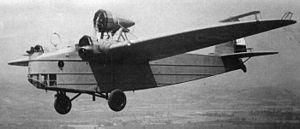- Dornier Do Y
-
Do Y A Dornier Do Y of the Royal Yugoslav Air Force Role Bomber National origin Germany Manufacturer Dornier Flugzeugwerke First flight March 1930 Primary user Royal Yugoslav Air Force Number built 4 The Dornier Do Y was a German bomber of the 1930s, the second bomber design by Dornier Flugzeugwerke.
Development
Design on the aircraft began in 1930, to follow up from the other bomber prototype of Dornier, the Dornier Do P. and the first aircraft flew in March 1930. It was a shoulder-wing monoplane of all-metal construction with fixed tailwheel landing gear, similar to the Do P, however this model had 3 engines instead of four. A civil transport version was proposed as the Dornier Do U, but this was never produced.
Operational history
The Do P and Do Y were displayed in the early '30s as freighter prototypes; they were in fact evolutionary steps towards creating the Luftwaffe's first operational bomber, the Dornier Do 11a. Two examples were produced for the Royal Yugoslav Air Force in 1931, followed by two more machines six years later. All four served with the 81st regiment at Mostar-Ortijes until replaced by the Savoia-Marchetti SM.79 in 1939. The aircraft were then relegated to transport and liaison roles until all four were captured by German forces at Kraljevo in 1941. One of them was subsequently handed over to the Croatian Air Force.
Fast passenger plane Do 15
In 1932 Dornier worked on two planes with the Wnr. 243 and 244. They originally were ordered by Yugoslavia, but then cancelled. These planes were part of the Do K and Do Y projects. On a request for tender by Deutsche Luft Hansa and the Reich Air Ministry for a fast passenger plane - which in fact should be able to get a fast bomber. Dornier offered the design with the new naming Dornier Do 15. The same request lead to the superior designs Heinkel He 111 and Junkers Ju 86. This caused Dornier to develop a new design, the Dornier Do 17.[1][2]
Specifications
General characteristics
- Crew: 4
- Length: 18.20 m (59 ft 9 in)
- Wingspan: 28.00 m (91 ft 10 in)
- Height: 6.79+ m (22 ft 3 in)
- Wing area: 111.0 m2 (1,194 ft2)
- Empty weight: 6,360 kg (13,990 lb)
- Gross weight: 8,500 kg (18,700 lb)
- Powerplant: 3 × Bristol Jupiter radial engines, 373 kW (500 hp) each
Performance
- Maximum speed: 250 km/h (160 mph)
- Range: 1,500 km (940 miles)
- Service ceiling: 6,000 m (19,700 ft)
- Rate of climb: 2.7 m/s (520 ft/min)
Armament
- 2 × trainable machine guns in open position in nose
- 2 × trainable machine guns in open dorsal position
- 12 × 100 kg (220 lb) bombs
References
- ^ (German)Heinz J.Nowarra: "Die deutsche Luftrüstung 1933-1945", Bernard & Graefe Verlag, Koblenz 1993, ISBN 3-7637-5464-4
- ^ (German)Flugzeug Classic Spezial 4 vom Geramond Verlag, München 2009
- World Aircraft Information Files. Brightstar Publishing, London. File 892 Sheet 26
- German Aircraft between 1919-1945
Aircraft built by Zeppelin-werke Lindau(Dornier) and Dornier Flugzeugwerke Idflieg designations
1914-1919Company designations
pre-1933RLM designations
1933-1945Do 10 • Do 11 • Do 12 • Do 13 • Do 14 • Do 15 • Do 16 • Do 17 • Do 18 • Do 19 • Do 20 • Do 22 • Do 23 • Do 24 • Do 25 • Do 26 • Do 29 • Do 212 • Do 214 • Do 215 • Do 216 • Do 217 • Do 317 • Do 318 • Do 335 • Do 417 • Do 435 • Do 635
P.59 • P.85 • P.174 • P.184 • P.192 • P.231 • P.232 • P.238 • P.247 • P.252 • P.254 • P.256 • P.273 • P.1075
Company designations
post-1945Lists relating to aviation General Aircraft (manufacturers) · Aircraft engines (manufacturers) · Airlines (defunct) · Airports · Civil authorities · Museums · Registration prefixes · Rotorcraft (manufacturers) · TimelineMilitary Accidents/incidents Records Categories:- German bomber aircraft 1930–1939
- Dornier aircraft
Wikimedia Foundation. 2010.

